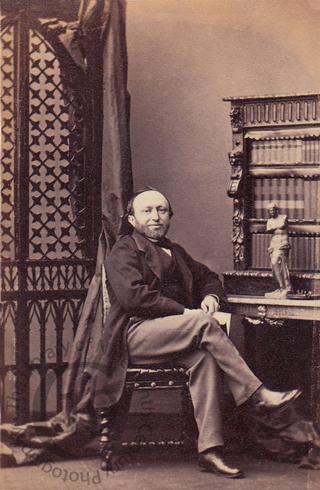
Ernst Schlesinger Benzon
A carte-de-visite portrait of the wealthy manufacturer Edmund Ernst Leopold Schlesinger-Benzon.
According to The Palgrave Dictionary of Anglo-Jewish History (edited by William D. Rubinstein): ‘Presumably of Jewish extraction, he was a very successful manufacturer of paper goods and labels in London – with branches in Manchester, Glasgow and Paris – and a merchant in the City. He left £400,000. Little or nothing is known of his life; his brother, also a papergoods manufacturer, was named Henry Schlesinger. The 1871 census lists Ernest Benzon, aged 51, described as a “steel manufacturer and iron merchant”, and his wife Elisabeth, aged 42; both were born in Hamburg. In her will Elisabeth Benzon (d. 16 February 1878, aged 50), of the same London address, named her son Henry Ernst Schlesinger-Benzon as her main beneficiary.’
Edmund Ernst Leopold Schlesinger Benzon died on 14 September 1871.
The following is a memorial tribute to Benzon written by the American abolitionist, feminist, novelist and journalist Lydia Maria Child and sent to an unknown recipient:
‘When I saw the announcement that Edmund Ernst Leopold Schlesinger Benzon had died at his country seat in Scotland I found it hard to realize that so much energy and ability had gone out of the world, leaving only for his enduring monument the great results he had achieved. I knew him initially, when he was a young man, fresh from his native Germany. He was then with the firm of Naylor & Co. of which he early became a prominent and efficient partner. To his energy, enterprise and remarkable genius for business that wealthy house is largely indebted for its extensive operations and eminent success. […] Never have I met with such buoyant energy, such incessant activity of thought and action.’
Several paragraphs follow concerning his generosity to his many brothers and sisters and to ‘the host of people in his employ’ to whom he proved both ‘benefactor and friend’. He also gave ‘generous pecuniary assistance’ to the anti-slavery cause. ‘In fact, all worthy claims upon his benevolence met with a prompt and munificent response’.
‘Business arrangements rendered it necessary for him to reside in England during the last twenty years of his life’. […] The activity of his mind was by no means entirely engrossed by business. He took a lively interest in all that was new in science, or beautiful in literature and art. His magnificent London residence in Kensington Palace Gardens was a favourite resort of eminent authors and artists, who were attracted thither by his elegant hospitality and the bright intelligence of his conversation.
‘During one of his visits to Germany, he married Elizabeth Lehmann, sister of the distinguished artist, whose works adorn the walls of the Louvre […] Mr Benzon was a very affectionate and indulgent husband and father, and his personal character was in all respects upright and pure.
‘When I try to realize that he has passed into another life, I can only think of him as curiously watching the growth of new planets, eager for insight into all the laws of the universe, and earnestly desirous to help in using them for the largest happiness of the greatest number’ [written by Child at Wayland in Massachusetts on 22 September 1873].
Photographed by Camille Silvy of London on 25 April 1861.
Code: 125875




